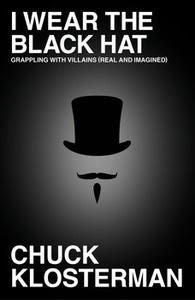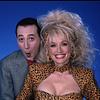Take a photo of a barcode or cover
I love Chuck. His best essay book yet. Thought provoking and pretty damn funny to boot.
I loved this book. I don't think it is for everyone, because the writer is super opinionated and descriptive, but it just happened to hit me in all the right places. I recommend it to those of you that want a little more insight to the philosophies of the darker side of life.
I found myself interested in this book based solely on the cover. I've mentioned this in a previous review I wrote, but I'm one of those people that can't help but judge books based on their cover.
Give it some curb appeal!
I teach high school English and I read this book for the first time at the beginning of last year because I was interested in teaching it to my seniors. I was not disappointed! Sometimes Klosterman's writing was a bit mundane and as if he wasn't interested in writing that particular chapter, but overall this was a great read. He brings up a lot of great points and ideas about what we consider to be a villain, both in real life and in fiction. He discusses people such as Bill Clinton, O.J. Simpson, and Batman just to name very few. He makes us questions our own beliefs while at the same time not necessarily telling us what to think. Klosterman allows the reader to come up with their own conclusions about each person he brings up. It made for some incredible classroom discussions and gave my students the chance to hear different perspectives and even brought us some debates. It was a lot of fun! I'm dying to teach this book again. Unfortunately, I'm at a different school now and the resources for obtain 40 copies of this book are not readily available. Someday...
I find myself eyeballing this book over and and over again because I want to reread it. Perhaps that will be a summer project...
Give it some curb appeal!
I teach high school English and I read this book for the first time at the beginning of last year because I was interested in teaching it to my seniors. I was not disappointed! Sometimes Klosterman's writing was a bit mundane and as if he wasn't interested in writing that particular chapter, but overall this was a great read. He brings up a lot of great points and ideas about what we consider to be a villain, both in real life and in fiction. He discusses people such as Bill Clinton, O.J. Simpson, and Batman just to name very few. He makes us questions our own beliefs while at the same time not necessarily telling us what to think. Klosterman allows the reader to come up with their own conclusions about each person he brings up. It made for some incredible classroom discussions and gave my students the chance to hear different perspectives and even brought us some debates. It was a lot of fun! I'm dying to teach this book again. Unfortunately, I'm at a different school now and the resources for obtain 40 copies of this book are not readily available. Someday...
I find myself eyeballing this book over and and over again because I want to reread it. Perhaps that will be a summer project...
I really enjoy Klosterman’s writing: he is incredibly smart, insightful and funny, and I really enjoyed this book. I find the topic fascinating. So why, might you ask, did it get 3 stars instead of 4 or 5? Well, the answer is both simple and kind of silly. I rated it lower because I read it at the wrong time. And here I really mean the wrong time in terms of dates, not ‘time’ in the sense that I wasn’t in the right headspace for it. You see, this was published in 2007, and many essays in this book are now extremely dated and could do with a major update.
The way he writes about Kanye, Sarah Palin, Bill Clinton and Taylor Swift simply don’t make sense anymore, and reading about how those things were 15-ish years ago felt kind of cringey. I suppose this is inevitable when one writes about pop culture: things change fast, and the last 5 years alone have been eventful, to say the least. Some of the essays stand the test of time, of course (few things have changed about Aleister Crowley, for instance), but I often felt taken out of my reading bubble when he would mention a celebrity whose trajectory has considerably changed since the publication date.
Aside from that, the book is a very interesting exploration at the various factors that influence the way we, as a society, feel about and react to people who do objectively bad stuff. Some villains get a pass because they are handsome, famous or rich, obviously, but other factors and biases sometimes influence our perceptions, and while this is unlikely to change, I think it’s a fascinating thought-exercise to pick at why we give way more attention to some villains and not others.
I will also admit that I had an expectation bias when I picked up this book, and because it wasn’t met, I felt a tad disappointed. I am not sure why, but I fully expected this book to discuss fictional villains in pop culture way more than I expected an essay about the LA Raiders (I also couldn’t care less about football, which doesn’t help in holding my interest). He does briefly mention Walter White, but we had a very solid era of anti-heroes in film and television in the 2000s and 2010s. I wanted to talk about Don Draper, BoJack Horseman, Loki, Magneto, Barry: am I a bigger nerd than Chuck Klosterman that this is what I care about?
I guess this review and my reactions to this book says a lot more about me than it does about the book. I would really love an updated version, though: I’d be curious to know what Klosterman thinks makes a villain now, after the Me Too movement, after the Trump administration, after covid…
The way he writes about Kanye, Sarah Palin, Bill Clinton and Taylor Swift simply don’t make sense anymore, and reading about how those things were 15-ish years ago felt kind of cringey. I suppose this is inevitable when one writes about pop culture: things change fast, and the last 5 years alone have been eventful, to say the least. Some of the essays stand the test of time, of course (few things have changed about Aleister Crowley, for instance), but I often felt taken out of my reading bubble when he would mention a celebrity whose trajectory has considerably changed since the publication date.
Aside from that, the book is a very interesting exploration at the various factors that influence the way we, as a society, feel about and react to people who do objectively bad stuff. Some villains get a pass because they are handsome, famous or rich, obviously, but other factors and biases sometimes influence our perceptions, and while this is unlikely to change, I think it’s a fascinating thought-exercise to pick at why we give way more attention to some villains and not others.
I will also admit that I had an expectation bias when I picked up this book, and because it wasn’t met, I felt a tad disappointed. I am not sure why, but I fully expected this book to discuss fictional villains in pop culture way more than I expected an essay about the LA Raiders (I also couldn’t care less about football, which doesn’t help in holding my interest). He does briefly mention Walter White, but we had a very solid era of anti-heroes in film and television in the 2000s and 2010s. I wanted to talk about Don Draper, BoJack Horseman, Loki, Magneto, Barry: am I a bigger nerd than Chuck Klosterman that this is what I care about?
I guess this review and my reactions to this book says a lot more about me than it does about the book. I would really love an updated version, though: I’d be curious to know what Klosterman thinks makes a villain now, after the Me Too movement, after the Trump administration, after covid…
Klosterman is amusing and insightful. His perspectives feel often important and sometimes transformative. This book made me want to explore his other works.
Essays from Klosterman about the public perception of villainy--Machaivelli, D.B. Cooper, Joe Paterno, OJ Simpson, Bill Clinton, Andrew Dice Clay and Batman, with an obligatory mention of Hitler, and with sidelights on tying women to railroad tracks as cliched shorthand for villains, the many movies in which unrealistic women try to ruin Michael Douglas' life, a newly developed middle-aged inability to hate bands and the rise of Perez Hilton. At the core, he offers an interesting definition of the bad guy: the person who knows the most and cares the least.
His arguments were concise. They were even good, but I guess I didn't care about them. This didn't go as deep as I wanted. I didn't find it all that interesting. And this is a topic that really interests me. I did like the end. A lot. It's something I've grappled with a bit lately. It also brought everything together. I guess, it just isn't the point I had wanted him to make. But, it is a good point.
funny
informative
reflective
fast-paced
There were some interesting ideas in here and I really like the author's voice, but I think it struggled to unite the threads of all of the different topics. It felt rambling at times which was nice to listen to, but not really something I typically look for in a book. And there are for sure some antiquated politics and language used in this book.
funny
informative
lighthearted
reflective
medium-paced







